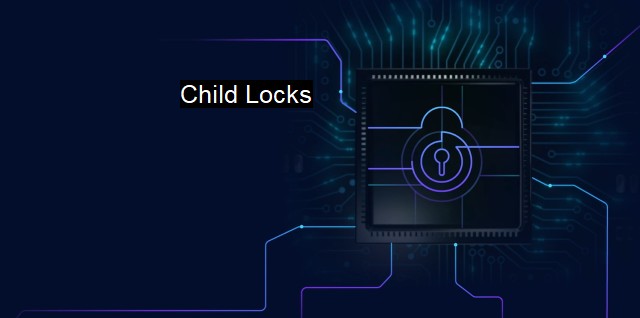What are Child Locks?
Protect Your Kids from Digital Threats: The Importance of Child Locks in the Digital Era
Child Locks represent an extremely important toolset to ensure protective measures for children while they explore and proceed online. It is crucial to comprehend this technology's importance, as the digital world today can be a myriad of beneficial resources and threatening risks to these innocent users whose understanding of safe online experiences could still be limited.Child Locks, also known as Parental Control Systems in cybersecurity parlance, are a set of technologies and software tools that allow parents or other authorized adults to restrict access to specific content, applications, and websites. This concept goes beyond just blocking inappropriate content. It includes controlling screen time, blocking dangerous games and apps, tracking children's online activities, and constant geolocation monitoring, offering the most inclusive protection for young users.
The importance of Child locks in cybersecurity is progressively growing with the proliferation of digital devices, social networks, online gaming platforms, and other potentially harmful web spaces. Today's children navigate through smartphone apps, social networking platforms, and explicit content online, having recognized as digital natives. This escalates the need for Child Locks systems to control and shelter them from these harmful possibilities through meticulous content checks, constant monitoring, and timely alerts.
Various devices, including smartphones, tablets, computers, and even smart TVs, provide built-in Child Locks or parental control functions today. Alternatively, third-party applications or software can also be employed. These antivirus and cybersecurity products generally use a blend of methods such as content filtering, usage management, computer usage management tools, and monitoring. They can comprehensively block inappropriate content, unwarranted social sites, explicit and violent content, filtering everything that young web surfers can encounter.
These systems can restrict how much time kids can spend on their devices. This not only helps protect children from potentially destructive content but also keeps their excessive screen time under check, promoting healthier digital habits.
Digital Child Locks encompass an unmitigated monitoring function, showing parents the content and apps their children are engaging with. For instance, it can notify parents if their child has downloaded a new application, tried to access a blocked website, or spent longer on a gaming platform than permitted.
a number of cybersecurity Child Lock systems foster geofencing and location tracking features. Geofencing enables parents to define the 'safe' geographical boundaries for their children, and if crossed, the system immediately alerts the parents. Location tracking ensures the knowledge about their child's whereabouts, promoting their physical safety alongside the digital one.
While Child Lock systems can provide comprehensive protection to children, there could be some potential pitfalls too. Excessive monitoring might lead to children feeling an invasion of their privacy. This is where careful, respectful conversation with children about their digital space, and the reasons behind monitoring their activities prove beneficial. no system can guarantee full-proof security. Thus, simultaneously teaching children about safe online practices is an indispensable part of digital safety.
Antivirus, and internet security parlance, Child Locks system makes possible the digital world's navigation in the safest means for the children, safeguarding their online and offline experiences. With optimization and balance, they can indeed provide security against the perils of the internet, monitoring and controlling digital behaviours, and fostering a digital environment for children that is safe, healthy, and productive.

Child Locks FAQs
What are child locks in the context of cybersecurity?
Child locks in cybersecurity refer to features that restrict access to certain features or content on a device, usually to protect children from inappropriate content or actions.Why do I need child locks on my antivirus software?
Child locks on antivirus software can help prevent unauthorized changes to settings or the deletion of important files by someone who does not have the authority to do so, such as a child who may not fully understand the consequences of their actions.How do I set up child locks on my computer to prevent my child from accessing inappropriate content?
There are different ways to set up child locks on your computer, including using built-in parental controls or third-party software. Some options include setting up restricted user accounts, filtering web content, or using a monitoring tool to track your child's online activities.Can child locks on my cybersecurity software also protect my personal information?
Yes, child locks can help prevent unauthorized access to sensitive information on your computer or mobile device. By setting up password protection or restricting certain actions, you can prevent others from accessing your personal data without your permission.| | A | | | B | | | C | | | D | | | E | | | F | | | G | | | H | | | I | | | J | | | K | | | L | | | M | |
| | N | | | O | | | P | | | Q | | | R | | | S | | | T | | | U | | | V | | | W | | | X | | | Y | | | Z | |
| | 1 | | | 2 | | | 3 | | | 4 | | | 7 | | | 8 | | |||||||